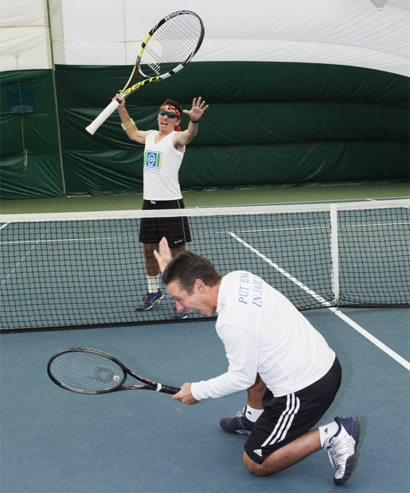What does it mean to “Play Great” ?
Our main goal at The Previdi System is to help our players win more matches. Which is why it is so interesting when we hear our players say things like “I don’t care if I win or lose, as long as I play well.” Other versions of this theme are “I played so well yesterday, I don’t understand why I’m playing so poorly today.” There’s also the very popular “I’m so much better than the way I’m playing today.”
You may have said one or more of these things during your tennis career. The question we want to ask is “What does it mean to “play great”? How do we play great on a more regular basis? What are the benchmarks we value as an indicator that we actually are playing great? I think our idea of playing great at The Previdi System is much different than yours and we’re hoping this information can help to change the things you value in doubles and make it much easier to play great all the time.
First let’s talk about the things that aren’t playing great.
- Playing low percentage Tennis
Have you ever gone to the casino and everything you put your money down on was a winner? We’ve all had that happen but we also know that there’s no long term success in that situation. The percentages are against you. This same dynamic presents itself in doubles quite often; if you think playing great is going for broke, trying a lot of random shots and hoping it all ends well, you will be disappointed almost all the time. Hitting a large number of winners is a perfect parallel to the gambling analogy above.The law of averages and lots of experience playing reminds us that this is not the new norm, but rather a statistical anomaly. Tennis matches are simply not won by singular shots that are so powerful they do not come back over the net. The problem for many players is that they think the time they play amazing tennis and hit a lot of winners should be the norm and all the times they make a million errors is the aberration. There’s no percentage in either situation and both are very temporary.
- Trying shots you haven’t perfected
We have a simple saying that boils this entire discussion down to it’s core for both players and coaches - “Never go for a shot in a match that you can’t make every time in practice.” This is why it’s so important to practice the first two shots over and over. Learn how to make first volleys in all situations and add variety to your returns but don’t experiment or try to learn them during a match. Creativity is the enemy. Stick to what you’re great at.
- Abandoning your game plan and your partner
“Freelancing” is a similar ailment to the ones mentioned above. It occurs when a player deviates from their team’s gameplan in the hopes that “changing it up” will keep them one step ahead of their opponents in a strategic sense. If you’re going off the ranch and hitting ego shots instead of staying within your teams game plan, you may make some amazing points but we guarantee no one will want to play with you. As in any team sport, having a plan and sticking to the plan is the most important way to be successful long term.
Now let’s talk about the things you need to practice and master to be able to play great.
- Consistent serves and returns.
- You need to be able to serve to three spots on each side; wide, body and middle (down the T).
- You need to have variety on your serve and that means spin.
- You need to make three returns; SAL (Short, Angled and Low crosscourt), Offensive Lob and Hard at the net player. Practice them every time you are on the court. While you’re practicing them your friends will be practicing their serves and vice versa.
- Play point situations so you always make the second shot of the point and hit your second shot to the right spot with the right amount of aggression for your situation.
- Practicing your “plays” until you don’t even have to think, you just react. You read the situation in a millisecond and choose and execute the right shot flawlessly. Remember this line; thinking is the enemy of execution!
- Here is the one that will make you a great player… get good at neutralizing your opponent when they have an advantage. They hammer a return at your feet and you hit a deft half volley right back at their feet! Do you want to play someone who can do that? No one does!
Here’s what playing great means to us!
- Consistent and decisive serves and returns.
- Being committed to your plan.
- Making the first two shots of every point.
- Not getting discouraged when your opponents have some success. Keep plugging away!
- Using “I need you” and “I’m here for you” as the two types of statements you make to your partner.
- Most importantly be a good neutralizer. Take a defensive situation and turn it around with proper shot selection.
Hopefully we have given you a new definition of what playing great is.Playing great means being “rock solid” in your choices and your execution. If you hit enough good shots, you’ll hit some great shots by accident! The best thing about our definition is that it is attainable on an everyday basis. It can be the norm, not the exception. It something we at The Previdi System strive for everyday. Hopefully you will too.
Playing “great” is being consistent, reliable, organized, disciplined...and winning more matches!

